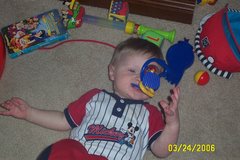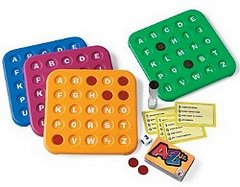Here is some general info on Alzheimer's and a couple of things that work well with them are music and art therapy. Another thing is familar things. Patients that I have dealt with that have alzheimers often will not follow direct commands. If you tell them to sit up and eat or walk, etc. they will just look at you with a blank stare, they might smile or just do nothing. Like they just don't understand. But if you get them up on their feet and kinda get them moving, then they would walk or if you handed them a toothbrush and toothpaste they would know to brush their teeth...things they know from the past often they just do naturally. This is of course not always the case in advanced patients. Each patient is of course different. They can become easily agitated and they may believe things that are not true...if you disagree with them then they can become agitated. Often they have difficulty expressing themselves, language can be repetitive and they often get stuck on the same phrase and say it over and over. So with all that...some things you might suggest are some of our musical cds that have common things...like head, shoulders, knees and toes or any with things that would be familiar to most. I would not suggest games that are difficult to learn as the patient would be hard to teach a new skill unless they were just a mild case. Things like easy puzzles..Opposite pairs. Or giant pegboard might be good. Toddler talk...since they will recognize the phone and its sounds and know what it is. Color, Craft and Carry might be good for the art therapy. Music makes my day DVD. They might like the Rainfall Rattle. Place and trace...easy puzzle and could use for artwork if they were a mild case. Sounds like Fun CD could be calming music. Playful patterns if a mild case might work. Starting Write or I Can Write. Possibly ABSeas.. fishing common activity and for mild case might enjoy playing the game. Sensory balls like tangiball and roll-a rama. Hammer Away might be another common activity since it involves hammering. Castlemarbleworks ...not so much the building part, but dropping the balls down some might enjoy. Hope this helps. These are just suggestions. Like I said each patient is different, so talk about the things common to Alzheimers and let the therapist or the director make the choices. If I were to bring some things to show...some of these might be good. I am a recreational specialist in nuirsing homes call me for more information!!
Alzheimer's and Your Loved One
Symptoms
Alzheimer's disease is the most common form of dementia. It's a progressive disease that gets worse with time. Alzheimer's does not affect each person the same way. But, there are some symptoms that usually happen as the disease progresses. Here is a list of some of the symptoms:
Alzheimer's progresses in stages over 8 to 10 years, on average, after diagnosis
Mild Alzheimer's disease
People with mild Alzheimer's disease may:
Have memory loss
Have trouble naming common items
Ask or say the same thing over and over
Get lost easily
Lose interest in things they once liked to do
Lose things more often than normal
Have personality changes
Moderate Alzheimer's disease
People with moderate Alzheimer's disease may:
Have poor memory of recent events
Have trouble with tasks such as washing dishes or setting the table
Have a hard time dressing for the weather or occasion
Forget to shave or shower
Argue more often
Believe things are real when they are not
Wander, often at night
Be worried or depressed
Need close supervision
Severe Alzheimer's disease
People with severe Alzheimer's disease may:
Have problems with eating
Have problems with speech or not speak at all
Not recognize you or other family members
Not be able to control bowels or urine
Have problems with walking
Enjoying Time With Your Loved One
While caring for your loved one may take a lot of time, you should still try to find time just for sharing life's simple moments. Finding things you and your loved one can do together can be hard. But it's worth it. Like you, people with Alzheimer's disease may enjoy doing activities that interest them.
Plus, events and activities may help your loved one enjoy life each day.
When you look for things to do, don't forget that Alzheimer's makes it hard to focus or learn new skills. Some people with Alzheimer's like to spend time on things that they enjoyed in the past. With your help, your loved one may still enjoy a hobby or pastime that was once a favorite. When you can, try to build on current skills. This may work better than trying to teach new skills.
Enjoying time together
Here are some things you and your loved one may enjoy:
Looking at photos
Talking about family history
Making a scrapbook
Playing simple games
Working puzzles
Listening to music together
It may also help to add light exercise to your loved one's day. Be sure to ask the doctor first. It may help your loved one sleep better, and it might be helpful to your mood.
No matter what you choose, try to:
Break each task into small steps
Give praise each step of the way
Watch for signs that your loved one is tired, so you can take a break
Make time to enjoy simple moments together at the same time each day
Tips I have found:
THE SECRET POWER OF ART
People who can no longer use words can express their deepest feelings, through the symbolic language of art.
Discover the groundbreaking book about art therapy for Alzheimer's disease:
When Words Have Lost Their Meaning:
Alzheimer's Patients Communicate through Art
After many years' experience as an art therapist to Alzheimer's patients, Ruth Abraham now offers an encouraging guide to communicating despite dementia.
Are you a psychologist, occupational therapist, healthcare or social worker, friend or family to an Alzheimer's sufferer? Find out how to engage with and celebrate each person's individuality and humanness for far longer than previously thought.
Art therapy draws on the rich resources of a lifetime — the temperament, emotions, experiences, and memories that make up one's internal world — that are still present for many years of the disease and provide material for profound communion.
Unfortunately, medical science has not yet provided any effective long-term treatment for Alzheimer's disease. In the absence of a much-hoped-for miracle drug, it is our responsibility to find ways to enhance the lives of those stricken with the illness. Current major therapeutic approaches consist of practical and emotional support and of strategies that help strengthen remaining capacities. Art therapy, a relatively new resource, sets out to do exactly these things, offering an additional means to bolster the humanity of the Alzheimer's patient. Art therapy proves to be a powerful medium because it bypasses the dominant verbal aspects of brain function. The work is based on the assumption that in spite of deterioration and advancing limitations, the dementia patient is nevertheless a person with an interior subjective world. The afflicted person, overwhelmed by an inability to articulate, can give voice to this inner world through the use of art materials. In providing that person with the symbolic language of art, an alternative channel for communication is opened. This is a vital gift when words have lost their meaning. ~~~quoted from the book When Words have Lost their Meaning by Ruth Abraham.
Music is a form of sensory stimulation, which provokes responses due to the familiarity, predictability, and feelings of security associated with it.
Participants without a music background can benefit from music therapy.
Music therapy provides opportunities for:
Memory recall which contributes to reminiscence and satisfaction with life
Positive changes in mood and emotional states
Sense of control over life through successful experiences
Awareness of self and environment which accompanies increased attention to music
Anxiety and stress reduction for older adult and caregiver
Nonpharmacological management of pain and discomfort
Stimulation which provokes interest even when no other approach is effective
Structure which promotes rhythmic and continuous movement or vocal fluency as an adjunct to physical rehabilitation
Emotional intimacy when spouses and families share creative music experiences
Social interaction with caregivers and families
Is There Research To Support Music Therapy For Persons with Alzheimer's Disease?
Through peer-reviewed journals inside the profession such as the Journal of Music Therapy, Music Therapy, and Music Therapy Perspectives, and extensive articles in journals outside the profession, AMTA has promoted much research exploring the benefits of music therapy for persons with Alzheimer's Disease.
Research Highlights
Music therapy reduces depression among older adults.
Music experiences can be structured to enhance social/emotional skills, to assist in recall and language skills and to decrease problem behaviors.
Music tasks can be used to assess cognitive ability in people with Alzheimer's Disease.
Music is effective in decreasing the frequency of agitated and aggressive behaviors for individuals diagnosed with Alzheimer's Disease and related dementias.
Individuals in the late stages of dementia respond to and interact with music.
Michele Marchetti
203-672-0681
www.discoverytoyslink.com/michelemarchetti
Subscribe to:
Post Comments (Atom)




1 comment:
Hi Michele
I appreciate your post on Alzheimers's since it's a group I've worked very closely with over many years. I lead a support group for both Caregivers as well as for Early Stage Alzheimer's patients.
Kristin
http://caregiving-kma.blogspot.com
Post a Comment